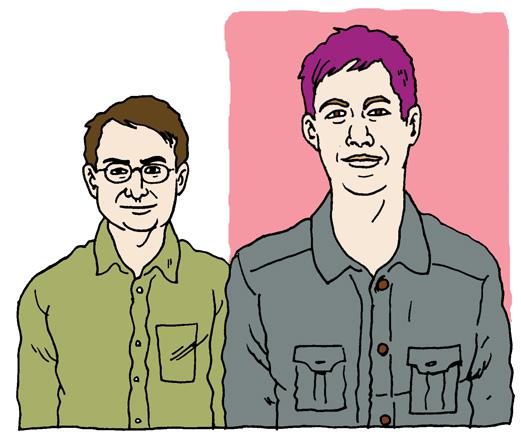Dr. David Reuben’s classic sex guide Everything You Always Wanted To Know About Sex (But Were Afraid To Ask) hit bookstores in 1969. Written in brisk question-and-answer format, the manual inspired a great Woody Allen movie, and reassured millions of insecure American men that the camera adds pounds to a certain porn star’s body part, too. Dr. Reuben’s enormous best-seller also dropped some formidable knowledge about the gays:
Q: What about all the homosexuals who live together happily for years?
A: What about them? They are mighty rare birds among the homosexual flock. Moreover, the “happy” part remains to be seen. The bitterest argument between husband and wife is a passionate love sonnet by comparison with a dialogue between a butch and his queen. Live together? Yes. Happily? Hardly.
Thirteen-year-old Joseph Schwartz had never read Everything You Always Wanted to Know About Sex when he came out at school one spring day in 2009, rode the bus home, shut himself in his suburban New Jersey bathroom, and downed way too many capsules of Benadryl. He had never been subjected to overt homophobia, was only a few years away from hearing the president of the United States express unequivocal support for gay marriage on national television, and was the son of two very supportive, loving parents. But no matter his direct relationship with what it meant to “be gay,” Joseph carried the weight of his difference—the stigma of being a bird in the “homosexual flock,” no matter how much public opinion of those birds and that flock had changed since 1969—and it almost killed him.
Or, at least, that’s what his father thinks. Joseph’s dad, New York Times national reporter John Schwartz, quotes Reuben’s dismissive take on gay relationships in his new memoir, Oddly Normal: One Family’s Struggle To Help Their Teenage Son Come to Terms With His Sexuality. He does so in one of his less personal chapters, a section of the book that talks broadly about the research on how structural stigmas—stuff like gays not being allowed to marry, or serve in the military—affect the mental health of gay and lesbian kids. One facet of this stigma effect is known as “internalized homophobia,” or “the process of taking to heart society’s negative attitudes about homosexuality.” This means that a kid like Joseph can go through childhood having never encountered the word “faggot” or “homo” or “fairy,” having never encountered an asshole like Reuben or been given any first-hand indication that he would not be able to lead a happy life as a member of a happy flock, and still, the self-hate seeps in, and he ends up in the bathroom, with the Benadryl.
No one but Joseph knows exactly what led him to try to commit suicide that day, and Oddly Normal is not Joseph’s story. It’s the story of his parents, who struggled for years over how best to raise a child whom they knew was gay, who wasn’t out to them or the world, and whom they thought was mentally crumbling under the pressure of that secret.
Jeanne and John Schwartz first suspected that Joseph might be gay when he was 3 years old. The clues will make progressive parents of the boys-can-play-with-princesses-and-not-be-gay, Free To Be … You and Me generation cringe: Joseph loved to dress up Barbie dolls in layered looks. He asked his parents to buy him pink shoes with rhinestones. He draped his older brother’s action-figure castle with beads. The Schwartzes only stopped wondering whether Joseph was gay when he was in fourth grade and they found pictures of naked men on his computer. Hunch confirmed.
Despite its subtitle, and despite the way Joseph’s closeted, tortured childhood fits into the larger cultural focus on gay teen depression and suicide, Oddly Normal does not, it turns out, intend to be the definitive story of what it’s like to raise a gay child. It’s actually much more a primer on how to advocate for a troubled kid in the public school system, particularly a troubled kid who doesn’t fit any specific diagnosis—though many teachers would suggest that Joseph was on the autism spectrum, the Schwartzes maintained that their son was more “squirrelly” than anything else. He struggled to keep his anger in check and was prone to outbursts. He was a voracious and advanced reader but had trouble writing with a pencil. He learned in a slightly different way and was developing at a slightly different pace than the other kids (though, reading this book, one suspects that many of those “other kids” probably also had their own developmental and emotional crosses to bear). His parents chalked many of Joseph’s problems up to the horrendous, suffocating pressure of being in the closet.
The Schwartzes spent years toggling between difficult teachers (Mr. Fourth Grade, who berated and belittled Joe all year, was the worst), difficult administrators, and difficult doctors who were quick to label Joseph as something other than what his parents felt he was. (In the end, they accepted a diagnostic nondiagnosis of PDD-NOS: pervasive developmental disorder—not otherwise specified.) They also consulted with what John Schwartz calls the “League of Gay Uncles”—gay colleagues and friends who gave feedback on how best they could support Joseph and a small window into what might be going on inside his head. They got a lot of conflicting advice and waded through a ton of conflicting or inconclusive research. Raising Joseph was a slog, and at times, the book reads that way.
Schwartz is meticulous in recording every detail—in first grade this happened, the summer after first grade this happened, in second grade this happened—but he keeps himself somewhat emotionally removed from the 13-plus years of anguish. As a parent, I understand this as a necessary coping mechanism. As a reader, it makes the book less compelling than the bones of the tale would suggest. In this telling, John and Jeanne approach nearly every setback as an opponent to be tackled. Initially bewildered by the byzantine New Jersey school system, they set out to conquer it, writing up “Joseph manuals” for his various teachers and counselors. They fight for district and state resources when they think those might help Joseph, and fight against them when they fear they might limit him. They are proactive advocates not only in school but also in finding Joseph a gay and lesbian community once he stabilizes after his suicide attempt.

Photo by Will van Overbeek.
Jeanne and John Schwartz are inspiring parental role models, and I’m sure I’ll think of them often as I approach the labyrinth that is the New York City Department of Education. (Can’t wait!) But I also can’t help wondering if this is really a book about “one family’s struggle to help their teenage son come to terms with his sexuality” or about one family’s struggle to come to terms with their teenage son. While psychologists and teachers repeatedly suggested to John and Jeanne that Joseph was having sensory issues or learning issues or emotional issues, they just kept screaming back (in their heads, at least): NO, NO, HE’S GAY. They clung to the idea that if their son could just be comfortable showing his sexual identity, being himself, he would be OK. I love and respect their total embrace of Joseph’s sexuality, but I await his memoir to determine if they were right.
—
Oddly Normal: One Family’s Struggle To Help Their Teenage Son Come to Terms with His Sexuality by John Schwartz.
See all the pieces in this month’s Slate Book Review.
Sign up for the Slate Book Review monthly newsletter.
